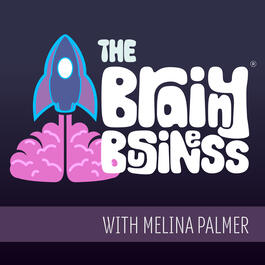
Why Every Business Needs To Care About Personal Finances, with Merle van den Akker
In today's conversation, I am joined by Dr. Merle van den Akker. Merle is a behavioral scientist who has recently completed a Ph.D. at the Warwick Business School, studying the effect of different payment methods on personal finance management. She decided to leave academia to apply behavioral insights in the real world and has become a behavioral science manager at a financial well-being unit in an Australian bank. She continues to research and apply behavioral science to improve financial services and consumer (financial) well-being. Next to this, Merle is a science communicator, running the blog Money on the Mind, and the MoneyPsychologist TikTok account, where she disseminates insights from the intersection of behavioral science and personal finance. Last, to not leave academia behind fully, Merle also still teaches behavioral science as well as courses on fintech developments at top Australian universities. Merle was also a finalist for Content Person of the Year in the Habit Weekly Awards in 2022 along with myself and many other amazing content creators in the space including next week's guest who won the award last year. In today's conversation, we are talking about personal finance – both for individuals and how it applies to any business. Stress at home can impact performance at work, and there are some ways businesses can be helping their employees feel more comfortable -- and do better work -- if they are thoughtful about personal finances and what is going on in the world around them. Even if your company doesn't believe it is impacted by inflation or the massive layoffs that have been happening recently...think again. Merle and I dig in on how social media and other availability-bias- and herding-fueled messaging is impacting everyone, and what companies can be doing to help their employees to feel more secure and less stressed. Show Notes: [00:42] In today's conversation, I am joined by Dr. Merle van den Akker. Merle is a behavioral scientist who has recently completed a Ph.D. at the Warwick Business School studying the effect of different payment methods on personal finance management. [02:21] Stress at home can impact performance at work and there are some ways businesses can help their employees feel more comfortable and do better work. [04:34] Merle shares about herself, her background, and the work she does. She runs the Money on the Mind blog, where she writes about how behavioral science applies to personal finance. [06:42] Spending on a credit card is incredibly different than spending with cash. [07:37] With contactless payments, people tend to spend a bit more and then they actually have a much worse recall of what they spent. [09:32] Mental accounting is expenditure and research tracking in your head. [11:51] It is important to ask thoughtful questions in business and research. [14:25] You have a mental and a physical account for savings and your credit whether you are in debt or not. [16:54] Behavioral science can contribute positively to the cost of living crisis in major ways. When people act out of fear they don't make great decisions. [18:54] Learned helplessness is a very dangerous state to get into. You need to be able to get into a mindset where you are still able to act. [21:50] Having too much pressure on people's time is impacting their ability to do really good, thoughtful work. [24:28] The present bias is a very inconvenient bias and is something you should be aware of. [27:31] As an employee, it is important to know what would and would not work and ask for that from your employer. An employer should be open and expectant to have these conversations. [30:36] There can be more thoughtful and creative solutions for ways employers can help that don't cost them a lot of money. [32:45] You can help be a solution for customers and employees by having this overall awareness of what is happening in the world and how that is going to be impacting behavior. [34:09] If your brain is in overload the last thing it wants is ambiguity. [35:42] You don't want people to act out of fear because they will make decisions that don't benefit anyone in the long run. That is something we should really try to avoid. [37:53] Social media algorithms give you more of what you show interest in. Something may feel like it is everywhere, when in reality the algorithms are just showing it to you a lot. [39:46] Always take the time in stressful moments to breathe and get out of that hot state to look and see what you can do differently. [41:01] It is a win-win situation to have employees that are not just cowering under an enormous load of stress and fear and as a result being rendered almost nonfunctional. [42:34] Melina's closing thoughts. [43:01] If you focus on helping your people with more aspects of their lives then just what feels immediately relative to your bottom line can have really great impacts financially and otherwise. Thanks for listening. Don't forget to subscribe on Apple Podcasts or Android. If you like what you heard, please leave a review on iTunes and share what you liked about the show. I hope you love everything recommended via The Brainy Business! Everything was independently reviewed and selected by me, Melina Palmer. So you know, as an Amazon Associate I earn from qualifying purchases. That means if you decide to shop from the links on this page (via Amazon or others), The Brainy Business may collect a share of sales or other compensation. Let's connect: Melina@TheBrainyBusiness.com The Brainy Business® on Facebook The Brainy Business on Twitter The Brainy Business on Instagram The Brainy Business on LinkedIn Melina on LinkedIn The Brainy Business on Youtube Join the BE Thoughtful Revolution – our free behavioral economics community, and keep the conversation going! Learn and Support The Brainy Business: Check out and get your copies of Melina's Books. Get the Books Mentioned on (or related to) this Episode: Nudge, by Richard Thaler and Cass Sunstein What Your Customer Wants and Can't Tell You, by Melina Palmer Scarcity, by Sendhil Mullainathan and Eldar Shafir Subtract, by Leidy Klotz The Power of Scarcity, by Mindy Weinstein Connect with Merle: Money on the Mind Merle on Twitter Merle on LinkedIn Top Recommended Next Episode: Common Errors in Financial Decision Making with Dr. Chuck Howard (ep 213) Already Heard That One? Try These: The Pain of Paying (ep 240) Hindsight Bias (ep 167) Time Discounting (ep 51) Common Errors in Financial Decision Making with Dr. Chuck Howard (ep 213) How To Set Up Your Own Experiments (ep 63) Mental Accounting (ep 282) That Time I Went Viral… with Dr. Daniel Crosby (ep 212) Survivorship Bias (ep 110) Herding (ep 264) Availability Bias (ep 15) Time Pressure (ep 74) The Overwhelmed Brain and Its Impact on Decision Making (ep 32) Loss Aversion (ep 9) Past, Present, and Future Biases (ep 246) Expect Error: The "E" in NUDGES (ep 39) Give Feedback: The "G" in NUDGES (ep 40) Ambiguity Aversion (ep 243) Other Important Links: Brainy Bites - Melina's LinkedIn Newsletter Learned Helplessness Invest now, drink later, spend never: On the mental accounting of delayed consumption
From "The Brainy Business | Understanding the Psychology of Why People Buy | Behavioral Economics"




Comments
Add comment Feedback